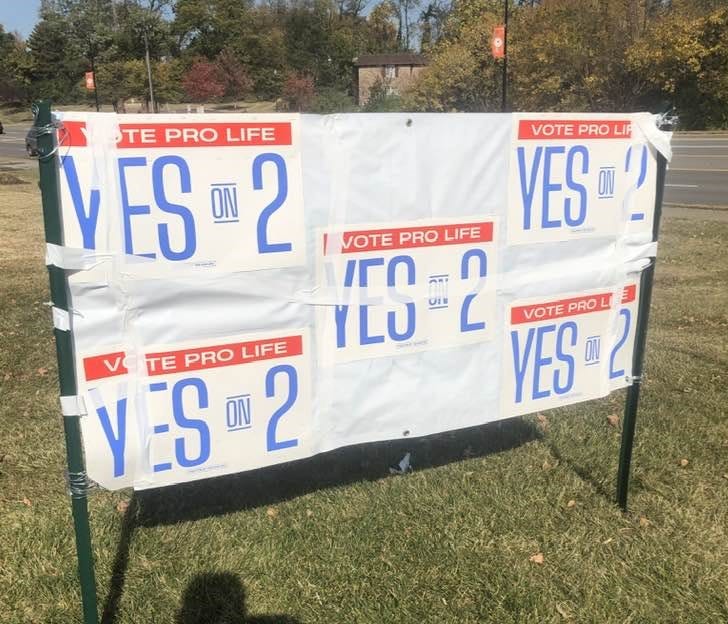
This is my next response in a dialogue on abortion with David. I truly appreciate this opportunity as it allows me to expand on matters in which I was not entirely clear on or did not provide enough details in my original post. These did not pass unnoticed by David’s careful eye.
Note to readers—I’ve copied certain passages from David’s response; however, I recommend reading his entire response to ensure you get his arguments in their entity.
This is his response to my post.
My prior response is here:
My original posting that started all this….
David, you objected to my statement that you cannot be both pro-life and pro-choice as follows:
“First, the more minor disagreement: your comparison of two subjective political/culture philosophies/ideologies - Pro-Life and Pro-Choice - to the objective scientific fact of pregnancy, seems to me way off. What one thinks philosophically about abortion is not at all comparable to what science says about a pregnancy. This is the same thing as comparing being a liberal or conservative to whether one has cancer or not. This is like saying one being either a Marxist or a capitalist is akin to whether someone has the flu or not.”
I admit I don’t quite follow your analogies above, in that our “philosophies/ideologies” should follow the realities of life. If my “pro-life” guiding principles are not in step to what science says about human life and pregnancies, I would need to reevaluate my principles. If I am misreading what you wrote, please let me know.
However, I do see a distinction between how people subjectively see themselves and how that compares to the objective truth. As an analogy to sin, we can be living in an objective state of sin, but subjectively unaware of that fact and therefore innocent before God. You are correct that among people “pro-life” and “pro-choice” is on a continuum and subjective as to how people see themselves. As an example, my favorite president, Ronald Reagan, considered himself to be pro-life, but his exceptions for abortion (e.g., rape and incest) could easily put him in the company of self-described pro-choicers who are really only concerned about having just those exceptions. After all, my original article was on the topic of pragmatic politics—that we should not push away those in the movement who are not completely in line with the “absolutist” position.
That said, “absolutist” has been given a negative connotation in our modern times (people far prefer subjectivity), but if dealing with an objective truth, it is the correct view to have. For example, I have an absolutist view on child rape—it is always evil without any exceptions or gray area. In the same spirit, by saying you could not be both pro-life and pro-choice, I am asserting that there is an objective and true standard for being pro-life. The standard, as I stated it, was that it “is never moral to directly kill an innocent human being.” I could have been more precise and stated that it “is never moral to intentionally kill an innocent human being.”
I also believe that each of your examples below do not betray an exception to this rule. Intention is everything.
The Principle of Double-Effect
David, you provided “four examples of when it is indeed moral and necessary to kill innocent people.” While even unintentionally killing innocents is not without moral concern (e.g., you negligently fire your gun down what you think is an empty street and kill an unseen person there), in each case you outline, the intention is a duty to protect the public and save lives, not to directly or intentionally kill the innocent people. This involves the principle of double-effect.
“1. In a hostage situation in which the killer is using a human shield and about to detonate a bomb killing the dozens of other hostages, it is moral to shoot and knowingly kill both the hostage-taker and the innocent person he is using as a human shield. This is necessary to save more lives than are lost. Other criminal situations less extreme than this also qualify.
2. In a situation in which a plane has been hijacked and is heading toward a city to crash, akin to 9/11, it is entirely moral for jets to be scrambled to shoot it down, killing all the innocent people on board. This is necessary to save more lives than are lost.”
In both of the above scenarios, the responder to a deadly threat—trying to act morally—does not intend to kill innocent people but makes a calculation as to how many can be saved by his response. In both example cases, it is also evident that no matter how the responder acts, the innocents involved will very likely die no matter what he does. In the case of the airliner, if the responding fighter pilot does not shoot down the airliner, the innocent passengers are going to be killed when the terrorist pilot crashes the airliner. The only question is whether the fighter pilot can prevent further deaths. The same calculation could be made for the bomb-strapped hostage—the responder must make the determination (based on the information he has at the time) that the bomb is likely real and that he can do nothing to save the hostage. The only question left then is whether he can prevent further deaths. So, using the principle of double-effect, the responder can act morally to stop a deadly threat to save lives even if innocents will most certainly die in the process.
This principle of double-effect also allows a doctor to act morally to save the life of a pregnant mother, such as one with an ectopic pregnancy. Here, the unborn child is removed from the fallopian tube and indirectly dies in the process. This medical procedure is distinct from an abortion in that: 1) Both the mother and child would certainly perish were it left untreated. 2) The child is not intentionally, actively killed, but regrettably dies in the process.
“3. In every war which is declared there will always be “collateral damage” — innocent people will be killed. Does this mean that all wars are by their very nature immoral? Absolutely not, of course. Wars need to be fought to prevent more people from dying than who would die in the course of the war. When Israel drops a bomb on a Hamas target hiding amid Palestinian civilians is Israel engaging in an immoral act? Certainly not. It is doing what is necessary for preventing more of its own citizens from being killed. Likewise, does the United States engage in an immoral act when it bombs a terrorist hideout, potentially killing the innocent people held prisoner by the Jihadists or in the vicinity of the target?
4. Most important, though: were the dropping of the two atomic bombs on Japan in order to win World War II and prevent an invasion of the Japanese mainland morally justified? Or was this an immoral act because innocent people were knowingly killed? I very much believe they were moral — fewer people died in these bombings than would have died if the war continued longer.”
The above scenarios involve a battlefield decision. For the sake of brevity, we assume we are waging a “just war” where all the categories are met (e.g., there is a just cause, all avenues of keeping the peace were tried first, etc.) Within that moral framework, we cannot intentionally target a civilian population. In the case of wartime killing, “collateral damage” is really another way of describing the principle of double-effect. Each of our attacks must have the intention to save more lives by winning the war as soon as possible, even though we know that some innocents may die unintentionally by our actions.
Thus, each attack should be reviewed on a case-by-case basis as each situation may be drastically different. Israel has a particularly sticky problem in that their cowardly enemies hide themselves among their civilians. As history has shown that they wage their wars in a moral fashion, I’m certain that they always take civilian causalities into account before attacking in such situations. I suspect that unless there is a direct, life-saving situation (like Hamas is about to shoot off a tactical nuke—to make an easy example), they hold off taking out a missile launcher or artillery piece when it’s housed, for example, right in the middle of a hospital full of patients. Otherwise, (I also suspect) they could have long ago reduced the number of attacks against them by immediately blowing up each weapon they detect on the ground, regardless of where it’s situated. That speaks well of them.
That said, we cannot make a blanket statement that they always have the moral right to drop a bomb without regard to innocent casualties as long as they are attempting to save their own citizen’s lives.
The same is true for the Allies’ bombing attacks during WWII, and frankly, without detailed research, I don’t quite know where I finally stand on some of them. The firebombing of Dresden by the British does not seem justifiable, but I’ve not read any detailed accounts of it to be sure. For the nuclear attacks on Japan, I am in a similarly unsettled place there. I tend to think it was justified, and I’ve read very good arguments for why it was the right call to make—you made the best ones in your response. It was a matter of tactics at that point in the war—100 bombers dropping 2000 bombs or one bomber dropping one. The fact that the military targets were entire cities was a problem. And they knew this, because they sent in planes ahead of time dropping leaflets to warn the residents to get out. Was this enough? That’s hard to say yes to since so many were killed. I’ve also heard well-reasoned arguments for why it was not justified. As it’s been locked into our unalterable past, I place that final determination in God’s just hands where it belongs.
But none of this brings into question whether it’s moral to directly/intentionally kill innocents—it never is. The question is always about how much was done to avoid the “unintentional” killing? Was it enough?
Applying this analogy to medical procedures. We have the innocent civilian (the baby), the life to be saved (the mother) and the responder (the doctor). The enemy is the life-threatening condition to the mother—it’s not the baby. (This is where many go wrong in their thinking on this, I believe.) So, can you take out the enemy without killing the innocent civilian, the baby? Most likely if nothing is done, the mother and the baby will both die. You must take out the enemy and in the process, the baby will unintentionally die. Some may call that an abortion, but it’s really a life-saving medical procedure.
In a similar vein, David, your next objection was:
“Merely saying, “Put simply, there is never a need to intentionally, actively kill a child to save a mother’s life,” does not eliminate at all that yes, there is sometimes a medical need to do that. All my life engaging in discussions of abortion with those on both sides, I’ve never heard someone make this claim. I’m sorry Alec, but I’m going to need to see much stronger medical consensus to back up your position that abortions to save the life of the mother simply don’t exist at all. What research do you have at hand to support this?”
I made that statement with the following in mind. I see a difference between an abortion—a procedure that is intended to directly kill and remove the fetus from the mother—and a medical procedure that is intended to save the mother. I can refer you to the opinion of one doctor that I took into account when I made my statement. Of course, I’m sure you can find others who will disagree. These, however, who would not be doctors who practice in a Catholic hospital to be sure.
But let me further clarify as I made a blanket statement regarding a situation that does change depending on the stages of the pregnancy. I did not specify, but I was thinking of a point in the last months of an advanced pregnancy. For this later stage, to quote Trent Horn in his book “Persuasive Pro-Life,” he writes that “… if a woman’s life is threatened late in pregnancy after the fetus is viable, since it takes longer than a day to stretch the cervix wide enough to abort a such a large fetus, it makes more sense to simply deliver the child by C-section.” In other words, there may arise a need, when a woman’s life is threatened, to remove the fetus from her. However, if there’s an emergency and time is of the essence, a C-section is faster than waiting to dilate the woman’s cervix to perform the abortion (killing the baby and pulling body parts out via the birth canal). But even so, why would it ever be necessary, medical or otherwise, to directly kill the baby? This would not save time or add any further measure of safety to the mother. It is simply a direct and intentional murder of the child.
In the case of a very early pregnancy, Trent writes that “when there is essentially no hope the child can be saved, it is permissible for doctors to perform a lifesaving operation on the mother with the indirect result being the death of the child.” Even in pregnancies in that middle stage before the baby is viable, Trent writes that to be moral, the “child’s death is not used as a means to save his mother but is a side effect of removing some of the mother’s damaged tissue.” Even so, life-threatening cases are thankfully very rare. Trent refers to Thomas Murphy Goodwin, professor of obstetrics, gynecology, and pediatrics at the University of Southern California, that “his medical service sees 15,000 to 16,000 births each year, and, excluding emergencies that occur in the third trimester, he sees no more than one or two cases per year that are life-threatening.”
In regard to your objection to my statement, “Again, we can’t make an exception for an intrinsically immoral act, even if our general motive is the safety of women,” you said:
“Yes, we can. In extraordinary circumstances then extraordinary exceptions to conventional, normal morality are necessary. During Covid it was morally necessary for the government to shut down religious services. That was necessary to keep people from dying needlessly.”
This statement seems to be saying that in an emergency situation, all normal morality goes out the window. What else would making an exception mean? But even more, we must differentiate an “intrinsically immoral act” from the example you provide. Shutting down religious services (whether I agree or not that this was a just action) is certainly not an intrinsically immoral act. Abortion, rape, murder, child abuse are all examples of intrinsically immoral acts. These are immoral acts by the very nature of the act. As an illustration, can you think of an exception that would make rape moral, or child abuse for that matter? You provided one for shutting down religious services—to save lives. Whether this was called for is open to debate, but it was a judgment call and not evil by its very nature.
The Lesser of Evils
And lastly your objection:
“Alec, we began this discussion with you noting that sometimes it’s necessary to compromise on one’s values in order to prevent a worse situation. That’s exactly what this is here. Assuming an absolutist position that not even in saving the life of the mother is abortion acceptable it is really no different than those you criticized for refusing to vote for a politician who supports birth control:…”
The “absolutist” position you describe above mischaracterizes the one that I hold, and I hope that my discussions above have helped clear that up. But to state it here again: abortion, a direct and intentional killing of an unborn child, is never necessary to save a mother’s life, nor is it ever morally acceptable. A medical procedure that is aimed at saving the mother’s life where the child may unintentionally die in the process is morally acceptable. This is an important distinction.
Also, I did not ever state that “sometimes it’s necessary to compromise on one’s values in order to prevent a worse situation.” On the contrary, my original post was an attempt to distinguish between compromising on the objective truth of pro-life values (e.g., supporting exceptions to abortion) and supporting a winning political strategy in this compromised world (e.g., sometimes choosing the lesser of two evils when voting).
It’s one thing to compromise with the truth—to decide that certain reasons for abortion are moral while others are not. It's quite another to compromise and support the better candidate who doesn’t quite have it all right in regard to abortion. It is simply not a compromise of values to support a candidate who represents more of my values than the other candidate. Similar to applying the principle of double-effect in a crisis situation, my intent is to support a long-term political strategy that may eventually save more lives. How well that has worked for us is also open for debate, but patience is a virtue.














